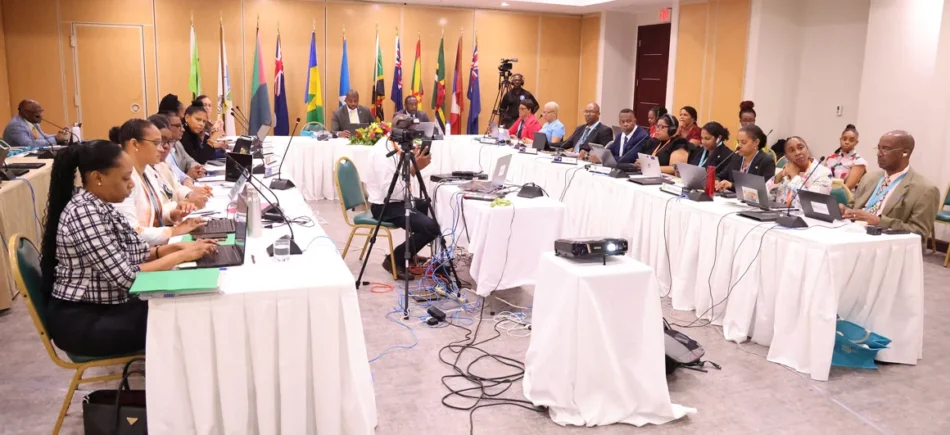OECS Ministers for Environmental Sustainability Affirm Key Decisions at COM:ES 1

From Danny Moonie Communications / Knowledge Management Specialist, Organisation of Eastern Caribbean States
The 11th OECS Council of Ministers for Environmental Sustainability (COM:ES 11) took place in Tortola, British Virgin Islands, on July 24-25, 2024, bringing together Ministers and high-level representatives from OECS Member States. The meeting addressed critical environmental challenges and opportunities and reaffirmed the region’s commitment to sustainable development and climate resilience.
The Council expressed profound sorrow over the recent catastrophic impact of Hurricane Beryl, which resulted in significant loss of life and property in Grenada and St. Vincent and the Grenadines. The unusually early formation and rapid strengthening of Hurricane Beryl were noted as indicative of the intensifying impacts of global warming and the increasing frequency of extreme weather events.
The new chair of the Council, Dr. the Honourable Natalio Wheatley, Premier of the British Virgin Islands, underscored the urgency of a regional approach to climate resilience:
“Climate change is the single greatest threat to our individual and collective viability, security, and prosperity as a small island subregion. Successfully navigating this existential threat requires a regional approach, and the OECS Commission is to be commended for ensuring that climate resilience remains top of the agenda year-round.”
Dr. Didacus Jules, OECS Director General, highlighted the significance of the roadmap to 2030, aligned with the revised St. George’s Declaration:
“When this Council of Ministers convened in Anguilla in 2023 for its milestone 10th regular meeting, Member States agreed on the consolidation of key priorities and aspirations to the end of the decade. This serves as a blueprint for regional action by Member States, the Commission, and partners working in the arena of environmental sustainability.”
Key milestones during the last year were highlighted including the provision of financial, technical, and capacity-building support provided by development partners towards environmental sustainability and climate resilience in the OECS.
Honourable Quincia Gumbs-Marie, the outgoing Chair of the Council on Environmental Sustainability, and Anguilla’s Minister of Sustainability, Innovation, and the Environment stated:
“We have worked tirelessly to strengthen our environmental policies, ensuring that they are robust and forward-thinking, while engaging our communities across the Caribbean, fostering a sense of ownership and responsibility towards our environment and empowering our citizens to take meaningful action.”
Several key outcomes and resolutions emanated from the meeting.
Key Outcomes and Resolutions:
- Support for Affected States: The Council affirmed its collective solidarity with Grenada, Saint Lucia, and Saint Vincent and the Grenadines as they recover and rebuild more resiliently post-Hurricane Beryl.
- International Community’s Role: There was a strong call for the international community, particularly major emitters, to take urgent action to stay within the 1.5-degree limit of the Paris Agreement to avert irreversible climate catastrophe.
- Implementation of MVI: The Council called for timely implementation of the Multi-dimensional Vulnerability Index (MVI) in Caribbean SIDS and ensuring pathways for inclusion in concessional and grant initiatives due to shared vulnerabilities.
- Loss and Damage Fund: The Council urged the acceleration of the capitalisation and operationalisation of the Loss and Damage Fund, ensuring easy and seamless access for all SIDS.
- Proactive Member States: Member States were urged to take proactive action in preparing to draw down on available climate funds and innovative financing mechanisms, including collaboration with the SIDS Center of Excellence and the proposed Development Bank for Resilient Prosperity.
- Continued Support: Development partners were encouraged to continue and scale up their support, including enhancing human capacity and institutional resources to overcome implementation deficits.
- Inclusivity for all SIDS: Called on the international community to provide appropriate and adequate resourcing for the implementation of the ABAS towards resilient prosperity in SIDS, ensuring participation and access by all OECS SIDS, including the overseas territories.
Member States were urged to prepare for and participate meaningfully in the upcoming Conferences of Parties (COPs) for the UNFCCC, UNCCD, and CBD, as well as the Intergovernmental Negotiating Committee (INC5) on plastic pollution. The importance of a constructive partnership with civil society, the private sector, youth, academia, and other stakeholders was reaffirmed to ensure a just and inclusive implementation of sustainable development initiatives.
The Council of Ministers for Environmental Sustainability continues to work collaboratively to ensure the conservation of ecosystems for economic prosperity and future generations. The incoming Chair, Dr. Wheatley urged everyone to “work in the spirit of togetherness and oneness in the common interest of our people and our future.” He continued: Let this be the COM:ES remembered for concrete and strategic action on the roadmap to 2030 and the Antigua and Barbuda Agenda for SIDS.”






